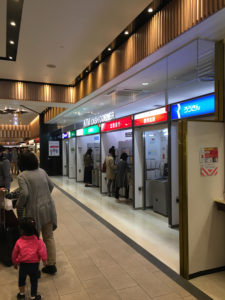Pressure mounts to enact inquiry by FSA on other banks ?
Recently the Financial Services Agency (FSA) ordered Suruga Bank to stop extending fresh loans for real estate investment for six months, over its improper practices related to such financing.
In recent years, the FSA has strengthened its oversight of surveillance over building financing for rental houses that have spread as tax saving measures for inheritance tax. There are an increasing number of examples of building properties in areas with low rental demand and inability to obtain enough rent income assumed by increasing vacancy.
There are cases in which loans can not be repaid and leading to the foreclosures.Those who are affluent with the upscale property have been targeted by the developers of new apartment buildings and the real estate companies.
Since around 2010, these developers and real estate companies have focused not only on loans involved in landowner’s tax saving measures but also on loans to individuals who do not own the land with limited self-funding. Then shared house scandal involving Suruga bank and Smart days (operator of shared house) exposed to the light in early 2018.
Given that Suruga’s improper loans to the shared house investment ‘Kabocha-no-Basha’ scandal, SFA is said to be investigating other regional banks on the similar improper loans.
FSA wants to know whether the regional banks accurately assesses the individual’s ability to repay, including its own funds, determines the amount of the loan and whether he / she is accurately grasping the change in the rental income as a repayment resource even after financing.
Since the individual salaried workers usually raise funds for the investment (land and building) almost entirely through borrowing,
the borrowing amount tends to be in the order of 100 million yen. Although it is good to be able to repay it with rent income, if the property is not fully occupied, you may have to fill in the gap with salaries and financial assets, making management unstable.
Also FSA wants to check the way banks evaluate collateral. If the loan is based on a price that is significantly greater than the actual situation, the bank can not collect all the loans even if the collateral is disposed of, and the risk of foreclosures increases. Although FSA is not asking for uniform collateral evaluation system for each bank, FSA is eager to verify whether the evaluation method is appropriate.
In the share house for women (Kabocha-no-Basha), in which Suruga lent a large amount of money, owner’s lease management stalled due to the collapse of the operating company.
The owner got the property at a price far exceeding the actual situation, and even if it sold it, the situation caused the borrowing money not to be repaid. Many of the surgical silver financing for share houses become defective and the collateral valuation method is also questioned. If the FSA tolerates similar excessive loans, it seems banks’ bad loans may inflate.
FSA wants to know whether the banks accurately assesses the individual’s ability to repay, including its own funds, determines the amount of the loan and whether he / she is accurately grasping the change in the rental income as a repayment resource even after financing.
Since the individual salaried workers usually raise funds for the investment (land and building) almost entirely through borrowing, the borrowing amount tends to be in the order of 100 million yen.
The owner got the property at a price far exceeding the actual situation, and even if it sold it, the situation caused the borrowing money not to be repaid. Many of the surgical silver financing for share houses become defective and the collateral valuation method is also questioned. If the FSA tolerates similar excessive loans, it seems banks’ bad loans may inflate.
Regional banks’ business environment is under pressure with extremely low interest rate for decades and shrinking population in their territory.
Banks in the local prefectures where the economic foundation is weak and they followed Suruga bank.
Many cases have forcibly increased real estate lending in the metropolitan area which is not usual battle ground for them. A business suspension order effective for such a long period is very uncommon in Japan.
The FSA began an on-site inspection of the bank in April 2018. As a result, the agency recognized a lack of governance at the bank, citing the failure by its management to detect the lending irregularities, including manipulations of documents.
Due to the fact the large amount of money is involved, the real estate investment usually requires
the financing by the bank. Very few people buy the property in cash. So banks play the major role in the transaction.
When the banks tighten the lending, the real estate market normally loses momentum.
FSA wants to know whether the banks accurately assesses the individual’s ability to repay, including its own funds, determines the amount of the loan and whether he / she is accurately grasping the change in the rental income as a repayment resource even after financing.
Final thought
Japanese individual investors have been enjoying the relaxed banking lending policies from early 2010
According to the report by Japan bankers association, the loans outstanding to rental houses throughout Japan are slightly less than 23 trillion yen (about $200 billion). Increase by 20% compared with 2009 just after the global financial crisis, the share of regional banks accounts for more than 60%. (Suruga bank is one of the regional banks)
Apparently the agency urged the bank to strengthen its compliance and customer protection and improve its loan screening procedures. The strong message from the agency shall definitely give a negative impact of the lending policies and stance by the banks. Some investors who bought shared housing units with loans from Suruga Bank are struggling to repay their debts due to sluggish occupancy rates. And some of these investors have formed a victims’ group, demanding the bank to forgive loan repayments however it will be highly unlikely for the bank to forgive the loan.
On macro view, in light of the historically low interest rate, Japanese regional banks need to find someone else to lend the money or they have to quickly find some promising projects in which they play a role of the financier. Can they do it ? I doubt it. So my expectation is that the loan for financing the real estate investment by regional banks will gradually be taken over by some other sound banks.
As far as I can see, a majority of national banks such as Mizuho, Mitsui-Sumitomo and some regional banks with the solid internal governance are still continuing the lending to the real estate investment if the property is in good location and the investor’s financial background is healthy. In a sense, the market has come back to the healthy condition without reckless and naive investors.
I am hearing some rogue real estate brokers are luring investors by seminar telling them that they can offer the real estate for the investment with guaranteed financing by a bank. Please do your own due diligence before you purchase the property.
Other Helpful Articles
Now, the real truth about the real estate investment in Japan : Kabocha no Basha and Suruga Bank scandal
How to avoid mistakes when choosing a real estate agent -Perennial Ryote-torihiki(両手取引) and Kakoikomi(囲い込み) problem-
High yielding, guaranteed rent should be too good to be true ?: ‘Kabocha no basha’ subletting problem in Japan
Reference:
Scandal-hit Suruga Bank ordered to halt new property loans for 6 months (Asahi Shimbun)
Toshihiko Yamamoto
Real estate investing consultant and author.
Founder of Yamamoto Property Advisory in Tokyo.
International property Investment consultant and licensed
real estate broker (Japan).
He serves the foreign companies and individuals to buy and sell
the real estates in Japan as well as own homes.
He holds a Bachelor’s degree in Economics from
Osaka Prefecture University in Japan
and an MBA from Bond University in Australia
Toshihiko’s book, “The Savvy Foreign Investor’s Guide to Japanese Properties: How to Expertly Buy, Manage and Sell Real Estate in Japan”is now out on Amazon, iBooks (iTunes, Apple) and Google Play.
About the book
Amazon.com Link




